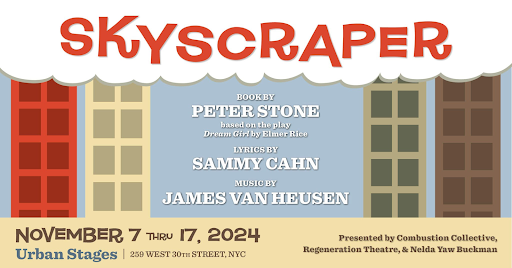Before it completely disappears (again), a review of SKYSCRAPER, a gem of a musical revival centered on NYC real estate.
Life scrolls ever more quickly. It's almost January 2025 yet I still recall the surprise of SKYSCRAPER (Urban Stages November 7-17, 2024), the freshness of this 1960s piece (book by Peter Stone, lyrics by Sammy Cahn and music by James Van Heusen.) After many years of existing only in memory and writing, this SKYSCRAPER was the first live onstage revival, since its Broadway debut in 1965. Multiple collaborators--Regeneration Theatre, Combustion Collective and Nelda Yaw Buckman wanted to produce this show, a short run in a small storefront theater on 30th St. Why? This was not a showcase for a bigger production. Economies of scale enriched the focus of this show, on target for its era and ours. Groups dancing seemed to defy our time and the small stage.
SKYSCRAPER was a successful musical with 248 performances, 5 Tony nominations, including "Best Musical." The ballad, "I'll only miss her when I think of her," was a hit for Sinatra. Why wasn't it revived before? One theory is the trend of non-singing actors in leading roles, left recordings of show music hard to assess. (Julie Harris, a non-singer, won a Tony for Georgina, though her singing may not have equaled her acting.) Yet love for this material was tangible in the direction and choreography by Avital Asuleen, music directed by Mathew Stern, and gentle nudges to the book nursed by Regeneration Theatre's Barnaby Edwards
It's a romantic comedy about the romance of progress in American cities. Though not a fan of musicals, I am a student of play structure. This story was worth telling, but did the performances pull it off? The show follows Georgina Allerton (Rachel Lauren James), as she emerges from her cocoon of daydreams. In "Occasional Flight of Fancy," she sings amid the jackhammers of a real skyscraper going up next door. The plot hinges on her refusal to sell the builder her house, the only impediment to the project. Despite the noise, the shaking, the escalating offers and threats, she is adamant. One of the joys of this play, is it's set before psychology had so many coded diagnoses of human behavior.
Georgina might be considered "crazy" for living in her daydreams, but her song "Occasional "Flights of fancy," moved me. She sings about having a right to fantasy, imagination, no matter what others think. Her historic building has claims on the future at least equal to the blight of many ugly skyscrapers on Manhattan's skyline. Not accepting a Skyscraper as progress is her right, as sole owner of the historic building. Similarly, her antique shop may have few sales, but the objects provide one-of-a-kind opportunities. Roger (Brian C.Veith) Georgina's shop assistant and ally in exotic escapism, was also great fun.)
The builder's sons try to romance her into moving, to no avail, though Tim (Travis Murad Leland) shows her how a skyscraper can be an elevator to the stars. Georgina is charming and imaginative, her singing and dancing are fierce with a hint of vulnerability with an opponent as compelling as Tim. Stanley, the lead construction worker, was played with knowing exactitude by Katryna Martalla. It was so fun to see the male construction workers of the era, played by women. And a deli with people grabbing whatever seat was open, often next to strangers.
At the end of this production, Tim gives Georgina, an unscripted copy of Jane Jacob's book, The Death and Life of Great American Cities. A perfect note in a show with the song, "Everybody has the right to be wrong."
S.W.
Note: I am a playwright and a publicist. I was involved with The Plays Are Literature Campaign (TCG) and approached media to review/mention plays not just in performance but scripts in book form. In England volumes of plays, as well as plays in performance, are reviewed. The Campaign did succeed in a singular review of Tony Kushner's "Perestroika," in the Los Angeles Times. Plays as a form of literature are disappearing, except in some libraries and specialty bookshops. Yet for theater to have a future, it has to have a past. For playwrighting to evolve, plays need to be available to be read--and reread.
The history, plays from around the world, as well as the work of major international troupes, like Peter Brooks, is almost unknown in U.S. There is a theater of vision and language beyond the "realism" of the Actor's Studio, well-adapted by TV and film.
(Major papers in England also review poetry, which is considered a literary form of interest to readers. The NY Times, did routinely review the works of major poets in print. But eliminated it, I was told, because that requires hiring "specialists.")



Comments
Post a Comment